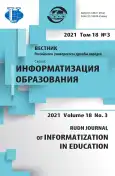Relevance, criteria and factors of cluster regional differentiation of students in the framework of informatization of cross-border education
- Autores: Fakova M.O.1
-
Afiliações:
- National Research University “Higher School of Economics”
- Edição: Volume 18, Nº 3 (2021)
- Páginas: 272-283
- Seção: INFORMATIZATION OF EDUCATION: A GLOBAL PERSPECTIVE
- URL: https://journal-vniispk.ru/2312-8631/article/view/321213
- DOI: https://doi.org/10.22363/2312-8631-2021-18-3-272-283
- ID: 321213
Citar
Texto integral
Resumo
Problem and goal. This article, based on the analysis of domestic and foreign experience, reveals the need to study the feasibility and possibility of dividing foreign students into regional clusters for the subsequent differentiation of methods and teaching materials within the framework of the development of approaches to the informatization of cross-border education. Methodology. A series of ascertaining experiments was carried out with students of the specialty “Economics” from Zambia, Mongolia, Kazakhstan, Uzbekistan and other countries, aimed at identifying differences in educational motivation, reflection and other characteristics of cross-border students. A model of approaches to informatization of cross-border education based on cluster differentiation is proposed. Results. A system of clusters was proposed, the expediency of introducing the described complex of criteria and factors, illustrated by the example of highlighting previous educational experience as one of the significant criteria for cluster regional differentiation of students, was substantiated. Conclusion. Students from different countries have different motivation, experience and perception of information, in many respects this is facilitated by school education. There is a need to find a balance between co-operative and differentiated education of cross-border students. Cluster differentiation of cross-border students is advisable for the subsequent use of information technologies in the framework of ensuring the variability of methodological systems of teaching individual disciplines at a university.
Sobre autores
Marina Fakova
National Research University “Higher School of Economics”
Autor responsável pela correspondência
Email: marina.fakova@yandex.ru
ORCID ID: 0000-0002-1043-2371
analyst, System Architecture Department, System Architecture and Big Data Directorate, Digital Transformation
20 Myasnitskaya St, Moscow, 101000, Russian FederationBibliografia
- Filippov VM, Grinshkun VV, Krasnova GA. Cross-border education. Platnoe Obrazovanie. 2008;(6):36. (In Russ.)
- Krasnova GA, Polushkina AO. State and prospects of distance learning during the COVID-19 pandemic. RUDN Journal of Informatization in Education. 2021;18(1):36–44. (In Russ.) http://dx.doi.org/10.22363/2312-8631-2021-18-1-36-44
- Markova AK. Formation of motivation for learning at school age. Moscow: Prosveshchenie Publ.; 1983. (In Russ.)
- Lyz NA, Shostak AA. The role of resources of educational competence of schoolchildren in adaptation to university education. Bulletin of the South Ural State University. Series: Education. Educational Sciences. 2016;8(4):30–36. (In Russ.)
- Moshkin AS, Kolesnikov AV, Koh NE. Motivation of educational activity of students. Scientific and Educational Problems of Civil Protection. 2017;(1(32)):90–96. (In Russ.)
- Golubeva NM, Golovanova AA. Factors of adaptation of students to the educational environment of the university. Izvestiya of Saratov University. New series. Series: Educational Acmeology. Developmental Psychology. 2014;3(2):125–131. (In Russ.)
- Valeeva DR, Spiridonova LN. Features of curatorial activities for the successful adaptation of foreign students. Science for Education Today. 2020;10(2):22–36. (In Russ.) http://dx.doi.org/10.15293/2658-6762.2002.02
- Tkach GF, Filippov VM, Chistohvalov VN. Development trends and education reforms in the world. Moscow; 2008. (In Russ.)
- Hili N, Majkl L. The scale and types of transnational education in Great Britain. Transnational Education. London; 2016.
- Vincent-Lankrin S. Cross-border higher education: trends and perspectives. Higher Education to 2030. Vol. 2. Globalisation. 2009. https://doi.org/10.1787/9789264075375-4-en
- Rasha EE. Analysis of the peculiarities of transnational and international education in higher education. Izvestia: Herzen University Journal of Humanities & Sciences. 2013; (161):219–224. (In Russ.)
- Bui HTN, Selvarajah C, Vinen DG, Meyer D. Acculturation: role of student – university alignment for international student psychological adjustment. Journal of Studies in International Education. 2021;25(5):546–564. (In Russ.) https://doi.org/10.1177/1028315320964286
- Zaslavskij AA, Grinshkun VV. Building an individual trajectory for teaching informatics using an electronic database of educational materials. RUDN Journal of Informatization in Education. 2010;(3):32–36. (In Russ.)
- Goncharuk NP, Khromova EI. Models of integration of digital and pedagogical technologies in the process of training future engineers. Kazan Pedagogical Journal. 2019;(1):31–35. (In Russ.)
Arquivos suplementares









